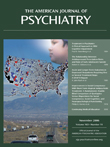To the Editor: In the May 2006 issue of the Journal, Drs. O’Brien, Volkow, and Li touch on a very serious issue regarding the proper labeling of a drug-induced brain disease known as either “addiction” or “dependence.” We agree with the authors’ concerns and with the need to have a better word than “dependence” in the DSM-V.
However, “addiction” is not the word. “Addiction” is unscientific, overused, misunderstood (e.g., addicted to my cell-phone), and clinically inaccurate (e.g., addicting antidepressants). What we have found in working with people in recovery is that the word is incredibly stigmatizing. The popular press is flooded with stories of crack-addicted babies and heroin addicts being thrown in jail. Sadly, in everyday use, “addiction” fails to differentiate between the medical (brain) disease associated with drug use by at-risk people and over-involvement with drugs (abuse) or activities.
Stigma-driven discrimination is seen when those with “addiction” cannot use our newest scientific advances in treatment because of insurance problems. Stigmatization is one reason we have insufficient research dollars for the study of drug actions on the brain. We fear that continued use of the term “addiction” would forever prevent society from destigmatizing this chronic medical illness.
Our Center faculty believes that the answer lies in proper education regarding the now-diagnosable differences between pathological chemical dependence and “bad-choice” drug abuse.
We indicate that the old (1950) World Health Organization terms “psychological dependence” and “physical dependence” are outmoded and are being phased out. We teach that the term “dependence” is a specific descriptor of the adapted brain state studied so intensively by neuroscientists
(1) . Our publications on neuroscience-based workshops clearly show that these professionals “get it”
(2) . We believe the field terminology is changing (e.g., gambling “addiction” has been replaced in many treatment centers with “pathological gambling disorder”).
To reduce confusion about “dependence,” the use of a qualifier such as “chemical dependence” could be used. It is only through such diagnosable (and clearly articulated) distinctions that we can hope to convince policy makers and the public that a major drug-overuse problem we are treating is truly a chronic medical illness (called “chemical dependence”), for which we need more treatment and research funds.

